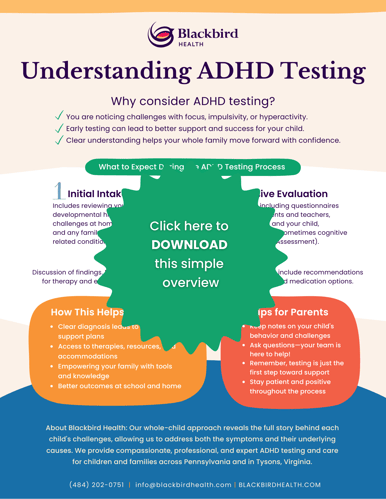Many families face a confusing reality: their child shows signs of ADHD, but anxiety seems to be at play too. Understanding how these conditions overlap can help you find the right support for your child. What we'll cover in this article: Why ADHD and...
The Parent’s Guide to ADHD Testing

What you can expect every step of the way
Medically reviewed by Nicole Garber, MD, Chief Medical Officer
If you’re concerned that your child may have Attention-Deficit/Hyperactivity Disorder (ADHD), you’re not alone. ADHD is one of the most common neurodevelopmental conditions in children, affecting about 10–11% of U.S. children and adolescents. The journey from first noticing symptoms to receiving a diagnosis can feel overwhelming, but understanding the ADHD testing process can help you and your child feel more confident and prepared.
What you'll find in this guide
At Blackbird Health, we specialize in virtual and in-person mental health services for children and young adults aged 2+. In this guide, I'll walk you through every step of the ADHD testing process: what it involves, how long it takes, which specialists are involved, and how you can best support your child along the way.
What is an ADHD test?
The term “ADHD test” is a bit of a misnomer. There is no single blood test, brain scan, or quick quiz that can diagnose ADHD. Instead, ADHD testing is a thorough, multi-step evaluation that gathers information from multiple sources using interviews, standardized questionnaires, and sometimes cognitive tests.
At Blackbird Health, our evaluation examines multiple factors that can impact focus and behavior, organized into three key areas:
-
Physical health factors
We examine conditions that might affect concentration and productivity, coordinating with your pediatrician for blood work and wellness checks to identify physical concerns or deficiencies. We assess sleep patterns, appetite, and nutrition, as poor sleep and inadequate nutrition affect focus regardless of whether ADHD is present. -
Mental health conditions
Many diagnoses overlap with ADHD symptoms. Anxiety can disrupt sleep, cause loss of appetite, and create racing thoughts—all affecting focus and concentration. Mood disorders like depression can lead to low motivation and difficulty completing daily activities. These conditions can also cause symptoms that look like hyperactivity and impulsivity. -
Sensory and developmental considerations
Some children have sensory-seeking behaviors that present as hyperactivity or impulsivity, while others may have difficulty with speech or processing disorders which may impact attention span.
This systematic approach ensures we identify the root causes of your child's challenges rather than making assumptions based on surface-level symptoms.
Why is ADHD testing important?
A comprehensive ADHD assessment is crucial for several reasons.
-
Accurate diagnosis
ADHD shares symptoms with other conditions (like anxiety, learning disabilities, or sleep disorders), so a careful evaluation ensures your child gets the right diagnosis and support. -
Tailored support
Understanding your child’s unique strengths and challenges helps guide effective treatment and educational accommodations. -
Access to local resources
A formal diagnosis can open doors to school-based support, therapy, and, if appropriate, medication. -
Relief and clarity
Finding the diagnosis can bring relief and clarity for parents, as it explains challenging behaviors and helps families understand that there are tools and strategies to help.
Who performs ADHD testing?
ADHD testing involves qualified healthcare professionals with specialized training in mental health assessment and diagnosis. Primary care providers can conduct initial screenings and sometimes make straightforward ADHD diagnoses. If the situation is complex or requires specialized testing, they'll refer you to a mental health specialist.
Mental health specialists include
- Psychiatrists who can diagnose ADHD, prescribe medication, and coordinate ongoing care
- Psychologists who use interviews, questionnaires, and standardized tests to assess symptoms and rule out other conditions
- Psychiatric nurse practitioners who can diagnose ADHD, prescribe medication, and provide care with a unique understanding of how physical and mental health interact
- Developmental-behavioral pediatricians who are trained pediatricians with additional specialization in developmental and behavioral issues including ADHD, can diagnose ADHD, and prescribe medication.
- Primary care physicians may be comfortable diagnosing ADHD and prescribing medication, though they may refer to specialists for complex cases or comprehensive testing.
At Blackbird Health, our team includes board-certified child and adolescent psychiatrists, psychiatric nurse practitioners, psychologists, and other specialists who work together to provide ADHD evaluations. If we suspect other conditions like autism or need speech-language or occupational therapy assessments, we provide these services within our practice rather than sending families to find multiple different providers on their own.
Parents share their experience
Families of Blackbird Health patients share about the benefits of care that addresses the strengths and challenges of the whole child.
"We've been impressed with Blackbird Health's services. It's so rare to find comprehensive care like this—from testing to therapy to med management (and more)—all in one place. In addition, the school advocacy support we receive is unprecedented. We no longer feel like we are managing things alone. We feel cared for and continue to learn so much from Blackbird. And they take insurance, too!"
Shannon
Virginia"... To date, this was the best decision we could’ve made for him. Along with starting medication, he has weekly therapy sessions, my wife participates in parent counseling sessions as needed, and Blackbird provided IEP advocacy services to make sure he is set up for success next school year. Having all of these services available under one roof has been absolutely incredible for my son and our family. Because of Blackbird, our son went from almost being moved to an out of district school in October to becoming Student of the Month in April!"
Ronald
PennsylvaniaThe ADHD testing process, step by step
- Recognizing the signs
ADHD symptoms often become noticeable when a child struggles with attention, organization, following instructions, sitting still, or controlling impulses—especially in settings like school or group activities. If you, a teacher, or another caregiver notice these patterns, it's time to seek an evaluation. - Registration and intake
Your first step is contacting Blackbird Health to register as a new patient. This involves working with our Care Navigator team to submit insurance information, complete intake forms, and schedule your appointment. The intake forms gather initial information about your concerns, your child's developmental history, and current challenges at home and school. - Initial consultation and evaluation
At Blackbird Health, we combine the typical consultation and screen appointments into one comprehensive 90-minute session we call the New Patient Visit. This appointment covers background information, medical history, family history, social history, and includes interviewing both the family and the child. Sometimes this appointment takes less time, but reserving 90 minutes ensures we have time to go over everything. - Teacher and school involvement
Teachers play a crucial role in ADHD testing since symptoms must be present across multiple settings. The Vanderbilt survey in particular is a quick and easy way to collect observations throughout the day in different areas—are they inattentive, is there impulsivity, are there behavioral concerns, does the teacher notice anxiety or mood concerns, and how do these symptoms impact not just academic performance but social and classroom behavioral performance as well.
For older kids with multiple teachers, we ask at least one teacher in reading and writing and one in math and science to fill out surveys, since sometimes children may focus better in subjects they're particularly interested in.
Blackbird also has providers who can act as liaisons with schools, helping to set up meetings, get more information, or discuss accommodations. However, this depends on what parents prefer—some parents want that information but may not pursue treatment or medication right away, while others may start treatment or medication and want the school to be aware right away. - Diagnosis and feedback
After collecting all information, we have a follow-up appointment to review results and discuss the diagnosis based on the evidence we've gathered. We will:
Review the findings and explain whether your child meets the criteria for ADHD.
Discuss any other conditions that may be present.
Answer your questions and outline next steps for treatment or support.
What are the main ADHD assessment tools?
- Clinical interview: The most important part of our assessment, going through developmental history and getting information key to ruling out other possible conditions
- Physical and medical assessment: Examining sleep patterns, nutrition, physical health, and any medical conditions that might affect focus and behavior
- Family and genetic history: Since studies show increased risk if a family member has ADHD
- Social and behavioral assessment: Examining how your child functions with other kids and whether they have difficulty with social cues or interrupting others
- Standardized rating scales: The Vanderbilt Assessment Scale, often called the “Vanderbilt Survey” and the Behavior Assessment System for Children (BASC) are assessments that parents fill out (preferably both parents separately to see if there are discrepancies) and teachers complete as well. This helps us compare results across different settings since ADHD must be present in more than one setting and you need to have a specific number of symptoms for diagnosis.
- Optional cognitive testing: Some patients decide to take the MindPrint Cognitive Assessment, which is a 60-minute cognitive test that looks at attention span, memory recall, information processing, and executive functioning. This is particularly useful as supporting evidence for an ADHD diagnosis, especially if the Vanderbilt surveys show discrepancies or we don't have enough information for a clear diagnosis. This test is for ages 8-21 and costs around $150 since it's not covered by insurance.
How long does ADHD testing take?
At Blackbird Health, ADHD testing can be completed within 2 weeks of intake. The main appointment is a combined 90-minute session that includes both the introductory information and the psychiatric evaluation. Potential delays may come from teachers returning their Vanderbilt surveys, but as long as we get both sets of surveys (parent and teacher), the next appointment can review those results.Outside of Blackbird Health, timing for ADHD testing varies due to several reasons including specialist availability:
- Best case: 2–4 weeks (if appointments are readily available and information is quickly gathered)
- Typical case: 4–8 weeks (allowing for scheduling, information gathering, and follow-up)
- Delays: Wait times for specialists or additional testing can extend the process to several months in some healthcare systems
How can parents prepare for ADHD testing?
- Gather information

Keep detailed records of your child's behaviors, noting when and where symptoms occur most often. Collect school reports, report cards, and work samples. Be prepared to share family history of ADHD or related conditions. - Prepare your child
Talk about the upcoming evaluation using age-appropriate language. Explain that we're doing this testing to understand how their brain works and that we're here to support and help them. This eliminates surprises and helps them feel less nervous or guarded. - Coordinate with teachers and caregivers
Let your child's teachers know about the evaluation since they'll likely be asked to complete questionnaires. Getting input from all adults involved in your child's life helps create a fuller picture. - Prepare logistically
Make sure your child is well-rested, has eaten before the appointment, and isn't feeling rushed. Bring relevant documents like previous evaluations, medical records, and school reports.
Age considerations and ADHD testing
The approach to ADHD testing varies significantly based on your child's developmental stage, as both the presentation of symptoms and our diagnostic methods must be adapted to what's appropriate for each age group.
- Preschoolers (ages 2-5)
At Blackbird Health, we typically don't diagnose ADHD in very young children. Many concerning behaviors (difficulty sitting still, trouble following multi-step directions, or impulsive actions) are actually normal for this developmental stage. If a preschooler shows extreme hyperactivity or significant difficulties in daycare settings, we might recommend occupational therapy, developmental assessments, or parent guidance on age-appropriate expectations. In this age range we can apply the Behavior Assessment System for Children (BASC) using the preschool (ages 2–5) level assessment. - Elementary school age (ages 6-12)
This is when ADHD diagnoses become most clear and appropriate. Children have more structured academic expectations, developed language skills for clinical interviews, multiple settings for observation, and teachers who can provide detailed behavioral observations. - Middle and high school (ages 13-18)
Diagnosing ADHD in adolescents presents unique considerations. Symptoms may have been masked by the child’s intelligence or supportive environments, academic demands increase significantly to reveal more, and teens can provide detailed self-reporting about their internal experiences. - Young adults (ages 18-26)
Many seek ADHD evaluations for the first time when struggling with increased independence, recognizing symptoms after a family member's diagnosis, or finding previous coping strategies no longer work.
Special considerations across all ages: ADHD often presents differently in girls and women with more inattentive symptoms. Twice-exceptional children (gifted with ADHD) may not show struggles until demands exceed their compensation abilities. And we also consider cultural backgrounds and family expectations that might influence symptom presentation.
 What happens after the ADHD test?
What happens after the ADHD test?
If your child is diagnosed with ADHD, you’ll work with your provider to develop a personalized treatment plan. This may include:
- Therapy services
At Blackbird Health, we set up therapy as soon as possible. Our therapists work with children on executive functioning interventions, building coping skills and self-esteem, improving resilience, and addressing underlying anxiety or mood concerns. Therapy usually entails one-hour individual sessions weekly. - Medication management
Stimulant and non-stimulant medication is sometimes an option. When appropriate, medication options can be discussed and managed through our medical staff. - Additional services
Educational accommodations, occupational therapy, speech and language therapy, social skills training, academic coaching, and family counseling may be recommended.
Educational accommodations
With a formal ADHD diagnosis, families can work with their child's school to implement classroom modifications through 504 Plans, or Individualized Education Programs (IEPs). These accommodations might include extended time on tests, preferential seating, breaks during long assignments, or modified homework expectations. Blackbird Health providers can help families navigate these conversations with schools, offering guidance on which accommodations might be most beneficial based on your child's specific evaluation results. We can also provide school advocacy support, setting up meetings with teachers and school staff to discuss your child's needs and ensure proper implementation of supports. The goal is to create an educational environment where your child can demonstrate their true abilities without being hindered by ADHD-related challenges.
Pennsylvania educational rights and resources
Pennsylvania schools operate under 22 PA Code Chapter 14 of the Pennsylvania School Code, which requires comprehensive evaluations and appropriate IEPs or 504 Plans for students with ADHD. Chapter 14 ensures that students with disabilities receive a free appropriate public education in the least restrictive environment.
Key Pennsylvania resources
-
Pennsylvania parent guide to special education: PaTTAN's comprehensive guide explains the special education process in accessible language for families
-
PEAL Center: Pennsylvania's statewide Parent Training and Information Center provides free support and advocacy for families navigating special education
-
Special Education ConsultLine: Call 1-800-879-2301 for direct assistance from Pennsylvania Department of Education specialists
-
Education Law Center of Pennsylvania: Legal advocacy organization offering information and support for children's educational rights; (215) 238-6970
-
Pennsylvania Department of Education special education resources: Official guidance and policies for families and educators
Virginia educational rights and resources
Virginia families benefit from Virginia's Regulations Governing Special Education Programs, which outline comprehensive requirements for evaluating and serving students with disabilities. The Virginia Department of Education provides detailed special education resources and procedural safeguards for families.
-
Your family's special education rights: Virginia's official procedural safeguards notice available through the Virginia Department of Education
-
PEATC (Parent Educational Advocacy Training Center): Virginia's Parent Training and Information Center provides free training, information, and advocacy support
-
TTAC (Training and Technical Assistance Centers): Professional resources and family support throughout Virginia
-
disAbility Law Center of Virginia: Legal advocacy and resources for special education rights
Interstate collaboration and support
Both states require schools to collaborate with healthcare providers when developing educational plans, making Blackbird Health's liaison services particularly valuable for families navigating these systems. Our providers understand the specific requirements and processes in both Pennsylvania and Virginia, including:
- How to request initial evaluations under each state's timelines
- State-specific forms and procedures for IEP and 504 Plan development
- Regional differences in implementation and available services
- Insurance considerations that may affect educational planning in each state
Whether your family is in Pennsylvania or Virginia, we help you advocate effectively for your children's educational needs while ensuring compliance with state and federal special education laws.
Frequently asked questions about ADHD testing
Is there a single “ADHD test” my child can take?
No. ADHD diagnosis is based on an evaluation using interviews, rating scales, and input from multiple sources. There is no single definitive test.
Can ADHD be diagnosed in very young children?
ADHD can be diagnosed in children as young as 4, but diagnosis in preschoolers is more challenging and requires careful assessment by specialists. At Blackbird Health, we typically recommend waiting until elementary school age for formal diagnosis.
Do most insurance plans cover ADHD testing?
Most insurance plans typically cover the initial 90-minute New Patient Visit. The Vanderbilt surveys are free, but the optional MindPrint test costs around $150 and isn't covered by insurance.
What if my child is not diagnosed with ADHD?
If your child does not meet criteria for ADHD, we discuss other possible explanations for their symptoms and recommend next steps for support or further evaluation. Remember, we look at the whole child—including speech-language evaluations, occupational therapy, or autism testing if indicated.
Ready to take the next step?
If you’re concerned about your child’s attention, behavior, or school performance, don’t wait. Early assessment and intervention can make a world of difference. At Blackbird Health, our team of expert clinicians is here to guide you and your family every step of the way—virtually or in person.
What I love about working at Blackbird Health is that we're not just looking to “diagnose and dispense” medication. We're really trying to be on this journey with families, looking at the whole child and being as comprehensive as possible, examining all the different aspects that can support their success.
This article is for educational purposes only and does not replace professional medical advice. Consult with your child's healthcare provider or a mental health professional for personalized guidance.

Ammara Chaudhry, CRNP-PMHNP-FNP
Ammara Chaudhry is a Certified Registered Nurse Practitioner with multi-state licensure who has worked in nursing for 15 years and specialized mental health care for 5 years. With advanced degrees from UC Berkeley, George Mason University, Drexel University, and Wilkes University, she provides comprehensive psychiatric care for children and families. Ammara believes in creating comfortable, collaborative partnerships between providers and patients while supporting diversity and reducing mental health stigmas.
Need ADHD testing? We can help.
Contact us today to schedule an ADHD evaluation or to learn more about our services. To speak to a Blackbird Health Care Navigator, call (484) 202-0751 or email Blackbird Health at info@blackbirdhealth.com.




